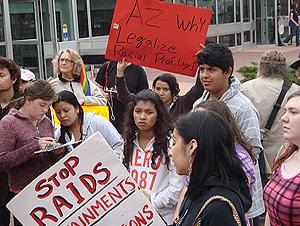Arizona’s immigration law sparks protests
Michigan protestors of Arizona’s State House Bill 1070. (Image by Flickr user DreamActivist (cc: by-nc-sa))
This story is adapted from a broadcast audio segment; use audio player to listen to story in its entirety.
Arizona Governor Jan Brewer followed tough words with tough action when she signed the “Safe Neighborhoods” bill into law last Friday.
“We cannot sacrifice our safety to the murderous greed of drug cartels,” said Brewer. “We cannot stand idly by as drop houses, kidnappings and violence compromise our quality of life.”
State House Bill 1070 is considered to be the nation’s strictest law against illegal immigration. Among other changes, the bill requires all immigrants to carry proper identification at all times, and broadens the power of local police to detain anybody suspected of immigration violations.
State and local leaders who support the bill praise its sweeping reforms and cite the state’s violent crime rate as reason alone for strict measures.
On the other side of the debate, activists and lawmakers, including President Obama, have called the bill a “misguided” attack on the “basic notions of fairness that we cherish as Americans.”
“I’ve instructed members of my administration to closely monitor the situation and examine the civil rights and other implications of this legislation,” said the president. “But if we continue to fail to act at the federal level, we will continue to see misguided efforts opening up around the country.”
The issue of crime, raised over and over again by Governor Brewer as she signed the bill, stems from one incident that’s proven symbolic and has dominated the coverage of the immigration debate in the state.
According to Randy Archibold, national correspondent for the “New York Times,” a couple of weeks before the governor signed the bill, a rancher in Arizona was shot to death by someone the police believe to be a smuggler from Mexico.
“It’s important to understand the powerful image of the rancher in Arizona,” said Archibold. “These are people who live right on the border, or really close to it, and have long complained about the effects of illegal traffic and drug smuggling … so the death of that rancher really was a shock wave that helped propel this bill forward.”
Valeria Fernandez, a reporter with Feet in Two Worlds, a project of the Center for New York City Affairs at the New School, says the bill has ignited a movement among the youth in Arizona, who have gathered to protest at Arizona’s capital. Fernandez adds that technology — in the forms of Facebook, Twitter and texting — has played a major role in the protests, allowing for an “instantaneous” movement to emerge.
“This law is just blatantly racial profiling,” said Liliana Clark, a student protestor. Clark, who says she is of Native and African American descent, claims the bill could impact her on the basis of her appearance.
“Because of our appearance, you’re automatically assuming that we don’t have papers, you’re assuming that we are criminals.”
The law doesn’t take effect until August, if it isn’t challenged in court, and many groups are mobilizing to ensure it is challenged.
Reporter Valeria Fernandez says many are hopeful the bill will spur movement on immigration reform, which has languished as the federal government focused on health care.
“A lot of people seem to be hopeful that this perhaps could be sort of a silver lining that immigration reform might be in the works … and of course the idea that you have congressmen who came down to Arizona and are saying that they are going to take action at the federal level — that really, really got people going.”
The “New York Time’s” Randy Archibold, who has been in Arizona interviewing people on both sides of the debate, says he is seeing responses that are polar opposites on the issue.
“The immigration issue has long divided Arizona … most people who cross illegally into the United States cross through Arizona. Half the marijuana seized at the border is in Arizona … but I do think this has really driven the gulf even wider.”
“The Takeaway” is a national morning news program, delivering the news and analysis you need to catch up, start your day, and prepare for what’s ahead. The show is a co-production of WNYC and PRI, in editorial collaboration with the BBC, The New York Times Radio, and WGBH.
